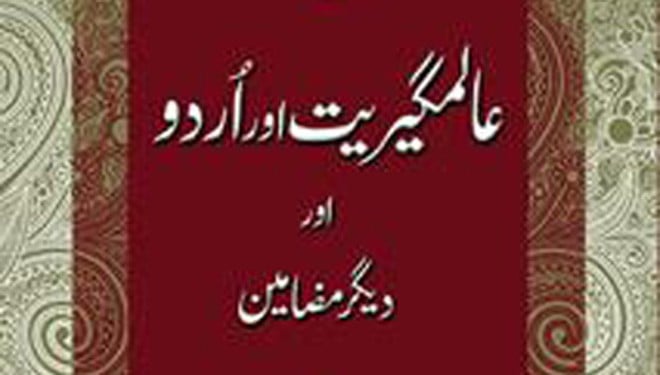
Nasir Abbas Nayyar, a critic of no mean repute, writes essays that restore one’s faith in both Urdu as a language and literary criticism

Nasir Abbas Nayyar is a critic of no mean repute who has authored many books on literary criticism over many years. He is well-read and keeps himself updated about the latest global trends and theories. Go through any of his books and you will be astounded by the way he treats his subject.
He starts cautiously and presents his case with facts without any sweeping statements. He remains neutral till the very end and does not try to force the reader to start thinking the way he thinks. Rather, he lets the readers make their own judgment by offering them plenty of food for thought. Nayyar’s previous book was on Majeed Amjad which was judged as the best work on the subject.
In this collection of erudite essays titled, Alamgiriat Aur Urdu Aur Deegar Mazameen, the author discusses a few pertinent issues vis-à-vis Urdu literature. The collection comprises of essays on Intizar Husain, Asad Muhammad Khan, Rasheed Amjad, Balraj Manra, Josh Malihabadi and Saadat Hasan Manto.
In the first article, that is also the title of the book, Nayyar presents a case for Urdu in the wake of globalisation. The author does not see any threat to Urdu; rather he warns it may face a few challenges. Urdu, he posits, is the language of media and therefore has a market and that is why Urdu does not face any existential threat as perhaps some languages of Africa do.
In another article, the author enlightens the readers about being an intellectual and whether the intellectuals bring any change. The topic has been discussed by so many writers that it sounds almost like a cliché. As I started reading the essay, I was pleasantly surprised by how ably Nasir Abbas Nayyar has put the whole issue under his scrutiny. "Erudition or scholarship does not offer mathematical solutions of the problems. Rather it makes you realise that human problems can be solved by depending upon the energies of Man. The few oft-repeated notions sound tyrannical if you repeat them again and again".
Josh Malihabadi’s magnum opus Yaadon Ki Barat has been scanned in an article. Nasir Abbas Nayyar finds many complexities in the text. He points out a few episodes from the book in which Josh seems to be subsumed by religion; he rebels against the norms and values of the society but does not rebel against religion. Rather, in the words of the author, he only poses so.
Next he puts our tradition of literary criticism in perspective. In the two essays, he also discusses the global trends and quotes many contemporary western critics to validate his point. He also rues that those who reject theories like Post-Modernism, Structuralism and Formalism do so without a proper understanding of these. To oppose the theory, both right-wing writers and leftists become one, and here comes the rare moment when their opinions match.
They both term it a "conspiracy of USA and western powers" and a progressive critic went a step further and stated that it was funded by Pentagon. Shamsur Rahman Faruqi, the author says, utters conflicting statements with regards to theory. At times, he acknowledges its worth to some extent and then, in some of his talks and lectures, he takes the contrary stance.
Nasir Abbas Nayyar sums up the whole controversy by saying that new theories should be discussed without any prejudice; one may agree or disagree on some points. He seems to be quite balanced in his approach as far as the subject is concerned.
In other essays on Intizar Hussain, Asad Muhammad Khan, Balraj Manra, Manto and Razia Fasih Ahmad, Nayyar does not disappoint the readers and brings new aspects of these writers with his immaculate critical approach. The prose is highly readable; yet it is without doubt scholarly. The book is highly recommended to all those who complain about the low standard of Urdu scholarship. It will definitely restore their confidence in Urdu erudition.